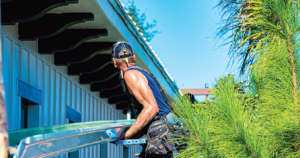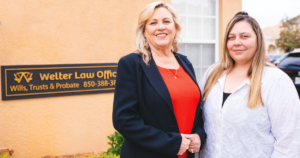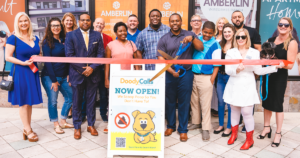Bilal Saleh, the owner of Zaytoun Mediterranean Grill on Cross Creek Blvd. at Morris Bridge Rd. is a U.S. citizen who was born and raised in Syria. Bilal wants the people of New Tampa to know that the vast majority of Syrians living here are productive members of U.S. society.
Bilal Saleh, wearing black dress slacks and a blue pinstriped dress shirt, sits in a booth at the Zaytoun Mediterranean Grill, the restaurant he owns with his brother Mohammad. Saleh’s voice is soft and his words are thoughtfully chosen.
He is troubled.
Originally from Damascus, Syria, Bilal (now a U.S. citizen) says he watches television these days, and the sights from his homeland horrify him, as much as the sounds, from talking heads, politicians, presidential candidates and so-called experts, mostly calling for the United States and other countries to turn away refugees fleeing a war that has dragged on for almost five years now and has left more than 200,000 of his people dead.
Plans to let refugees into the U.S. have been facing stiff resistance. The terrorist killings in Paris on Nov. 13, and unofficial reports of a discovery of a Syrian passport — later deemed a fake — next to one of the terrorists, quickly turned much of the country against the refugees, conflating the Syrian people themselves with the terrorist group commonly known as ISIS.
“It’s just amazing how within the span of a week, the Syrian people have turned from victims to a threat (in people’s eyes),’’ Bilal says. “The Syrian people have been bombarded, killed, raped and tortured for four years. That really hurts, when you see how suddenly (it happens)….yesterday you were a victim; today, you are now a threat.”
Bilal is quick to condemn ISIS and the terrorist attacks in Paris and other places.
“We vehemently disagree with all that is going on. It is definitely against Islam and against the teaching of the Prophet (Mohammed),” he says.
It angers him, because as a result, anti-Muslim fears and threats are at an all-time high in this country, according to the Council of American-Islamic Relations. Mosques are on high alert, Islam is being protested, violence has been threatened.
Bilal says he himself hasn’t been threatened specifically, but the Masjid Daarus Salaam (which translates to “house of peace”) mosque on Morris Bridge Rd. a couple of miles south of his restaurant, where he and his family worship, has received threatening phone calls and hate emails. Facebook comments have been harsh. The vitriol in the public square has definitely been heating up.
“If I compared the reaction after the Paris attacks to the reaction after 9-11, I see this reaction as much more, I don’t know how to describe it…enormous,” Bilal says.
To a degree, Bilal says he can understand the fears and concerns. It didn’t feel great, he says, when he traveled internationally on business in his years working for MCI Telecommunications and was held for a search every time, or how he was suspiciously viewed after 9-11. “We lost over 3,000 people (on 9-11),’’ he says. “I understand.”
Those fires burned out. But now, even larger, hotter flames are being stoked.
“I am a little worried,’’ Bilal says. “I’m worried about a crazy person coming to the mosque on a Friday where we have 500 people. It’s highly unlikely but it is possible….we’ve gotten some (safety) recommendations from the (U.S.) Dept. of Homeland Security. We haven’t done anything. Maybe we should, I don’t know.”
Most disappointing, perhaps, is what Bilal says is a pattern of troubling disinformation espoused by some of the Republican presidential candidates. Ben Carson, for example, compared Syrian refugees to “rabid dogs.” Others have called the refugees terrorists and accused Muslims of celebrating after 9-11.
“For the average person watching CNN and FOX News, I really sympathize with them,’’ he says. “I see where they are coming from. If I were them, I would have the same feelings. There is a very credible story with pictures with experts talking, and they are instilling fear. I would be concerned. I really feel sorry for them, I would like to reach out to them and explain to them at the same time. But, for politicians, leaders, to spread this misconception, I don’t understand. They are playing on (public) fears. It is not American. Everyone is an expert, but no one lets us talk.”
Bilal left Syria in 1978 as a 17-year-old, when his father took a job in Saudi Arabia as a professor. A violent uprising in Syria around that same time made it unsafe to return.
He came to the U.S. as a student, and attended Eastern Tennessee State University in Johnson City. He holds a Bachelor of Science (B.S.) degree in Electronics Engineering, a Master of Science (M.S.) degree in Computer Science and a Master of Business Administration (MBA) degree from the Kellogg School of Management at Northwestern University in Chicago. He also holds three U.S. patents.
His four daughters are all college graduates. Two are currently in law school.
The process for Bilal was far easier than it is for political refugees today, who have to pass through a rigorous 13-step process, which can take two years.
In the last year, just over 100 Syrians have settled in Florida, with 36 of them making Hillsborough County home.
Bilal says there are just a handful of Syrian families in New Tampa, but they are productive members of society and take pride in their achievements, and certainly don’t deserve to be a singled out for the atrocities being committed overseas.
“If you look at the Muslim community, and the Syrian community in particular, we are engineers, physicians, lawyers, business people, innovators, technologists,’’ he says. “Chances are, talking to your readers, one of you or someone you know has been treated by a Syrian physician. The bridge you drove on, designed by Syrian engineer. I myself hold three U.S. patents, I have contributed to the technology industry. We are people who are providers, who are contributors. We’re not freeloaders, we’re part of the fabric of this society.”
That fabric, however, may be fraying, as anti-Islamic violence pops up across the country.
Still, Bilal looks around, and while the hatred and anger towards Muslims is disconcerting, it has not changed his view about America. He still thinks it is a wonderful place and a beautiful country and he is still proud to be a U.S. citizen. And, even when darkness seems to be descending, he says there is always seems to be a ray of hope.
“One of the my customers, he called me over and he said I came here for two reasons — the second reason is because you have good food,’’ Bilal says. “But the first reason is to make a statement that I support you. I disagree with what’s being said. I told him people like you make me love this country even more.”





No comment yet, add your voice below!